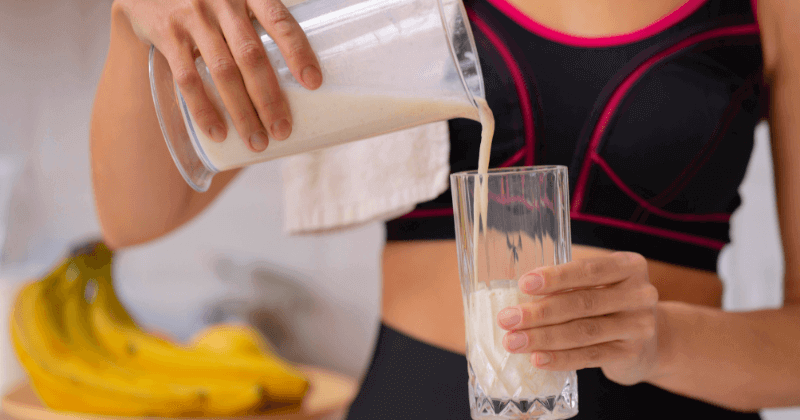Can We Take Creatine With Milk? Let’s Find Out
Creatine - If you’re into fitness, bodybuilding, or even general health, chances are you’ve heard about creatine.
It’s one of the most popular supplements in the world, known for improving strength, supporting muscle growth, and enhancing workout performance.
But there’s one question that keeps popping up, especially in India:
Can we take creatine with milk?
With our desi love for milk, curd, lassi, and ghee, it’s no surprise that many Indian gym-goers want to know whether mixing creatine with milk is a smart choice or not.
This blog post will help you understand the science, practical tips, and Indian context behind this question.
Let’s dive deep into the topic with six helpful subtopics.
What is Creatine and Why Do People Take It?
Before we answer whether creatine can be taken with milk, let’s understand what creatine is and why it's so popular.
Creatine is a naturally occurring compound found in our muscles. It's made from three amino acids – arginine, glycine, and methionine – and is stored in your muscle cells.
It helps your body produce more ATP (adenosine triphosphate), the primary energy currency used during high-intensity workouts like weightlifting, sprinting, and HIIT.
Benefits of Creatine:
-
Increased strength and power during workouts
-
Faster recovery after intense training
-
Improved muscle mass gains
-
Enhanced endurance in short bursts of activity
Creatine is not a steroid, nor is it harmful when taken correctly. It’s one of the most researched supplements in the fitness world and is considered safe and effective.
Forms of Creatine:
-
Creatine Monohydrate – the most studied and affordable
-
Creatine HCL
-
Creatine Ethyl Ester
-
Buffered Creatine
For most people, Creatine Monohydrate is more than enough, and it's the one we’ll focus on in this article.
How Is Creatine Usually Taken?
Creatine can be consumed in multiple ways, but the most common form is a powder that is mixed into a liquid.
Common ways to take creatine:
-
With water
-
With fruit juice (especially grape or orange juice)
-
With a post-workout protein shake
-
With milk
The standard dosage is:
-
Loading Phase (optional): 20g/day for 5-7 days (divided into 4 servings)
-
Maintenance Phase: 3-5g/day
Many people in India mix their supplements with milk out of habit or for taste. But is this practice effective or even advisable when it comes to creatine?
Let’s explore that next.
Can You Take Creatine With Milk?
Yes, you can take creatine with milk. It’s safe, enhances absorption, and adds protein and calories, great for muscle growth.
There’s no scientific evidence to suggest that milk negatively affects creatine's effectiveness.
Milk may actually support creatine absorption due to its carbohydrate and protein content.
Milk has a low glycemic index but contains lactose (a natural sugar), which can help create an insulin response. Insulin helps shuttle creatine into your muscle cells more efficiently.
What Happens When You Mix Creatine With Milk?
-
No chemical reaction occurs that destroys creatine.
-
No digestive issues for most people (unless lactose-intolerant).
-
Better taste and texture than plain water.
-
Added calories and protein, which can support muscle growth.
So yes, if you enjoy milk and digest it well, combining it with creatine is fine. It might even enhance the effects, especially post-workout.
Creatine With Milk vs Water vs Juice – What’s Better?
Let’s compare your main options when it comes to taking creatine in India.
| Liquid | Creatine Solubility | Taste | Digestion | Muscle Uptake Support |
|---|---|---|---|---|
| Water | Moderate | Neutral | Easy | Basic |
| Juice | High | Sweet | Easy | Good (due to sugar) |
| Milk | Moderate | Creamy | May cause issues for lactose-intolerant people | Good (due to protein + lactose) |
Pros of Mixing Creatine with Milk
-
Tastes better than water
-
Provides protein and calories, useful for bulking
-
May improve creatine uptake
-
Easy to combine with whey protein
Cons
-
It may not be ideal for the cutting phase due to added calories
-
Can cause bloating if you’re lactose intolerant
-
It might be heavier to digest before workouts
Verdict: For people trying to gain weight or muscle, creatine with milk is a great combination. For those trying to lose fat, mixing with water or a low-calorie beverage may be better.
When Should You Take Creatine With Milk?
Now that we know you can take creatine with milk, the next question is when you should take it?
Best Time to Take Creatine
-
Post-workout: Most studies suggest that creatine is best taken after your workout, when your muscles are more receptive to nutrients.
-
With a meal: Taking creatine with a carb and protein-rich meal improves absorption.
-
Anytime of the day (as long as you’re consistent): Timing is less important than daily consistency.
Why Post-Workout with Milk Works?
Milk provides both protein and carbohydrates, two nutrients that enhance creatine absorption.
For Indian gym-goers, having a banana shake with milk and creatine post-workout is an easy and effective strategy.
Sample Post-Workout Creatine + Milk Shake
-
250 ml toned milk
-
1 banana
-
1 scoop whey protein
-
3-5g creatine monohydrate
-
Optional: Peanut butter or oats for extra calories
This shake gives you energy, protein, and helps drive creatine into your muscles all in one go.
Final Thoughts
Here’s the bottom line:
Yes, you can take creatine with milk, and in many cases, it may even help with muscle gain, recovery, and nutrient absorption.
For Indian fitness enthusiasts who already enjoy milk-based drinks, this combo is convenient, tasty, and effective.
Just remember:
-
Use lukewarm milk, not hot
-
Stick to 3–5g/day of creatine monohydrate
-
Drink plenty of water throughout the day
-
Avoid if you’re lactose intolerant, or opt for plant-based milk like almond or oat milk
Consistency is more important than timing, so choose what fits best into your daily routine.


